We last checked in with Star Trek: Voyager scribe Kirsten Beyer back in August, where we covered her entire Voyager journey up to that point — now our she’s back, speaking to us about her new novel, “Protectors.”
![]()
TrekCore: First of all, congratulations on making the New York Times Bestseller List! Excellent news, and very well-deserved!
Kirsten Beyer: Thank you, and it is very kind of you to say that it is well-deserved. That part is harder to take in. For now, I’m just happy that it happened. It wasn’t something I expected. I was relieved that I didn’t break the streak Trek books have been on lately. I think the solid work so many authors have done for several years now is finally starting to be recognized and I’m delighted to be a part of that.
TrekCore: One of the things you excel at is mining the rich history of Trek for story ideas to continue or expand upon. For example, Protectors follows up on what I consider to be a very mundane episode of Voyager, “Twisted,” and crafts an amazing and compelling story from it. What can you share about your process of choosing what episodes or events you want to explore further?
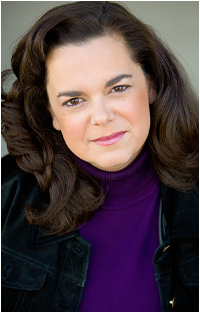
Kirsten Beyer: It’s tricky. My instinct, despite all of the evidence to the contrary, is to avoid looking back as much as possible. I know readers are curious about species Voyager encountered in the past and enjoy interesting follow-ups.
But it is way too easy to simply say, “Gee, I wonder what the (insert alien of the week) are up to now?” and build a story around it. For me to be willing to go back there has to be a really good reason to do so.
In the case of Janeway, sorting out “Endgame” felt mandatory. It was such a troubling episode on so many levels, and the events of Destiny were directly linked to it, so addressing how it would affect the character when she returned was not optional.
It also became a great point of focus through which to explore many of the inconsistencies that were written into the character over the years, so I wasn’t bothered by the need to go there.
The issue of Riley’s people (from “Unity”) was also a no-brainer because of the actions of the Caeliar, and the fact that part of the fleet’s stated mission is to search for former Borg or Caeliar in the Delta Quadrant. Chakotay rightly ordered them to follow up on Riley as soon as he was free to do so. If the Caeliar transformation had never happened, it would be hard to justify revisiting those characters again just because it might be interesting. There always has to be an in-story reason to go anywhere.
Riley’s people made sense in terms of the broader mission as well as thematically. Eternal Tide was as much about family as anything else and even had they not procreated as they did, they remain a part of Seven’s “extended” family for better or worse. Axum was a similar problem, so we find him again in Protectors. Had it not been for the creation of the catomic plague, I might have waited a bit longer to deal with Axum, but a story that dealt with him in one way or another has always seemed inevitable to me.

When it came to “Twisted,” it was truly one of the last places I thought to search for the hook I needed. But I had never gotten over all of that data that was dumped into Voyager’s computers and then never addressed again. That made it easy to choose. Everything else about the episode made it less appealing.
But as you will see when the story continues through the next two books, this was never really about solving the mystery of all that data so I could fill in a blank. The core story of this entire trilogy began when I decided to create The Worlds of the First Quadrant. Working backward from there, I needed a way to get Voyager close to their territory, but not right in the middle of it at first.
I needed to introduce them without just dropping out of warp and discovering them so that the crew would begin the first contact part of the mission with some preconceived notions that would become obstacles. And whatever episode I chose needed to give me enough room to make later story connections that won’t be apparent until the whole story is told. It needed to be just vague enough, if that makes sense, so I could really connect it in a way that would surprise readers without feeling forced.
That’s how “Twisted” got woven into this story, and truly how any past story gets called up again. I have to need it badly enough to overcome my inherent disdain for re-treading old ground.
TrekCore: The fact that Janeway doesn’t immediately take up her position with the fleet was a welcome development, and the counseling she has to undergo feels very realistic. Unlike the Voyager television series, the giant “reset button” is never hit. Would you say you are generally averse to the reset button? What is the most satisfying part of exploring the “fallout” of tragic or life-changing events in the lives of your characters?
Kirsten Beyer: For me, the “reset button” is the laziest form of storytelling imaginable. I could never create a story that relied upon such a reset for resolution. It’s just cheating. I will never forget “Year of Hell.” By the time that story aired, I had already starting pitching stories to Voyager’s producers and one of them had been telling me about this concept they were working on…this “Year of Hell” that would strip the ship down to its bare bones.
I was all for it. I was expecting it to last an entire season, which was one of the early discussions. Instead, it was fabulous episode right up until the end.
I just don’t think it’s fair to take an audience on a journey no one but the audience will ever remember. I’m going to ask for an exception to that rule in the case of “Course: Oblivion,” which I thought was a really interesting follow-up to one of the worst Voyager episodes ever (“Demon”). Even though our crew never learned of it, it was a story worth telling. It has always kind of haunted me, like a lot of Bryan Fuller’s work.
But, the point of accumulating experiences, especially painful ones, is to learn from them. The crew learned nothing from “Year of Hell.” The whole thing just made me sad because the writers did it to themselves. They had no business going as far as they did if they didn’t have a better resolution in their pocket.
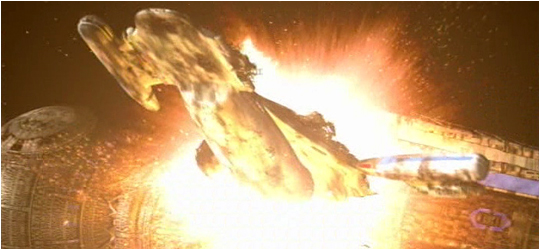
When things happen in my stories, they always happen for a reason, and that reason rarely has anything to do with how cool I can make a plot. I just won’t accept anything less from myself because I don’t think it’s fair to waste people’s time and I don’t think the readers, who only get one or maybe two stories a year from us in the books, would ever let something like that slide now. They deserve better.
One of the criticisms I heard often about Eternal Tide was that it made all of the suffering the characters had endured when Janeway died meaningless. I respectfully disagree. There were many ways I could have told that story that would have rendered the past meaningless. I consciously went out of my way as I created it to make sure that nothing was lost, beyond the ships and characters that died in Omega.
I always intended to use the events of that story to propel all of the characters forward in a new direction. It’s only satisfying to me if I can create a story that will honor the past while making room to integrate it into the lives of the characters the next time we see them.
By far the most rewarding part of refusing to ignore anything that has gone before, however, is that fact that when you use it, you have conflict already baked into the cake and conflict is essential to story and character development.
TrekCore: Where there any particular inspirations for Janeway’s journey in this novel?
Kirsten Beyer: Beyond recognizing that she was going to need to spend some time living with all that had just happened to her before she resume anything resembling a “normal” schedule, not really. My instinct as I was developing the new trilogy was to keep her off-stage for as much of the first book as I could.
Although she was by no means the sum total of Eternal Tide, that was definitely her story as much as anyone else’s. I wanted to shift the focus off that for a bit. I needed to reconstitute the fleet and to keep them looking forward rather than back. But each time I considered what I needed to do with Janeway, the story kept getting bigger. And once I had found the heart of it, the discussion with Counselor Austen, I knew it was okay that her story took more time to tell than I had planned.
I think a lot of readers needed to see her face all of the consequences of her past actions in order to feel like she deserved our trust again as commander of the fleet. Certainly there are some who will follow her anywhere. But for me to feel complete peace about that, we had to see it happen right in front of us. So we did.
TrekCore: Several plot threads are left unresolved at the end of Protectors. In some cases, it looks like dark times are ahead for a few of our characters, in particular Tom and B’Elanna, and Seven and Axum, not to mention The Doctor and the heart-wrenching decision he made with regards to his programming. What are the benefits of taking characters to the darker places, and how do you know how they will respond? When you write the characters, do you find yourself dictating where they go, or is it a more organic process with the characters informing you of where they are headed?
Kirsten Beyer: I create the obstacles the characters will face very consciously. Every character is where they are when a story begins and I always have a pretty good handle on that these days, since I’ve had them all to myself for so many years now. I tend to craft the challenges that are coming with an eye toward exploring the next relevant facet of a character that interests me, but I never get to completely control how it all turns out. Which sounds weird, I’m sure. I mean, I’m writing it, so if I’m not deciding, who is?
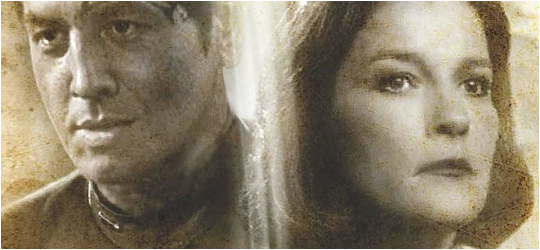
There have just been too many times in the writing of these books when I have planned for something to happen and as I was writing it, something else occurred to me that felt better and more organic. Often times, it complicated my life considerably, but I have learned to trust it when this happens. I was trained as an actor so when I am writing these characters, I am actually playing them from their point of view in any given scene. I never had any patience for actors who would come to a moment during a scene and say, “But my character would never do that.” They did. It’s right there on the page. So please figure it out so we can all get on with our lives, was always my reaction to that kind of thing.
Now that I’m the one in control, I understand the challenge of this a lot better. It is always crystal clear to me in writing any scene when I am trying to impose something I need for plot on my characters. Inevitably, I get to that point, and just can’t write what I had planned. It sucks. But it’s true. In some dark subconscious realm where all of these stories are growing inside me, these are real people.
When they refuse to do something I’m asking, a big red flag goes up and I just stop. That is the moment in the creative process when it is appropriate for the character to raise their hand and say, “But my character would never do that.” I hate it when they are right, but the always are. So I always listen.
TrekCore: October will see the release of the next novel in the Voyager series, Acts of Contrition. Are there any hints or sneak peeks you can provide us about that novel?
Kirsten Beyer: Probably not many that those who have already read Protectors can’t see coming. We’re going deep into the Worlds of the First Quadrant. If you know me at all, you should probably assume that’s not going to go terribly smoothly. We’re also going to continue to explore the catomic plague, and of course, Seven’s reunion with Axum. Doctor Sharak gets more development and a familiar face for Voyager fans who we haven’t see much of in the relaunch helps with that.
For Acts of Contrition, I decided to try my hand at writing the first actual scene ever written almost completely in Tamarian in any of the books. I sort of like how it turned out, so I hope others will too. Tom Paris will face his mother in mediation and that story will be resolved…mostly. And yes, we will learn more about the alliances being formed in the Delta Quadrant between former enemies that seem determined to undermine the fleet.
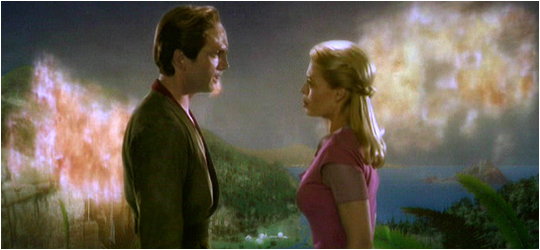
There’s a lot going on. One of the most consistent complaints I’m seeing about Protectors is that it felt too much like a set-up for another story. It was. I hope folks will be more understanding when they see how much more there is to come and how it all builds from what began in Protectors and is ultimately resolved in the final book.
TrekCore: You have mentioned that Protectors and Acts of Contrition make up the first two parts of a trilogy. Can you provide any hints about what we will see in this trilogy, as well as maybe where you see the series going after the three books are released?
Kirsten Beyer: The working title for the final volume of the trilogy, which I am writing at the moment, is Atonement. That’s not final, so don’t be upset with me if it changes at some point in the future. Since the day it came to me, I have been unable to think of it as “Atonement” in the sense of making up for some past sin, because that has never been the point. I always hear it broken up in my head as “At-one-ment.”
Obviously that’s not a real word, but it comes closer in my mind to all of the themes I’ve been toying with for the past year now, which is why I can’t let that title go. For me, this whole story has been about bringing conflicting, even irreconcilable points of view into alignment with one another; to find a way to work going forward that honors each person’s values and where they came from, without losing our own identity in the process or sacrificing our own sense of what is right.
This story, like so many stories I tell, started with something that has nothing to do with Trek that bothers me deeply. Exploring it here has helped me sort through some of my own struggles with the issues that divide me from others I care deeply about. I didn’t have a good answer when I started the project. I do now, which is nice for me, and the telling of this story is what helped me find it.
I don’t know if all of that will be clear on the page when the story is finished. But I’ve done what I can to unearth it for myself and my readers.
On a more practical level, this trilogy serves as the end point for the fleet’s first year in the Delta Quadrant. All of the story threads that have been unresolved up until this point will be completed, leaving us with pretty much a blank slate going forward, which is simultaneously thrilling and terrifying from where I’m sitting.
After that, I have no idea. Okay, I have a few ideas, but none that are well-formed enough for me to share anything about them. What I do know, is that I will be addressing them as soon as I am done with Atonement, because I have already been asked to continue carrying the story forward once this trilogy is done. The paperwork is not final, so as always, that could change. But that is the plan right now.
TrekCore: In our last interview, you mentioned a work of original fiction you were working on. What more can you tell us about that project?
Kirsten Beyer: It has sat, untouched, for the past year and will sadly continue to be neglected in the coming year. The commitments I have made to continue writing Voyager mean that it will be at least this time next year before I will be free to go back to it. It’s frustrating. I have truly hoped to find a way to work on it while continuing on with Voyager, but there simply aren’t enough hours in the day.
TrekCore: Thank you so much for providing your insights into Protectors and the Voyager relaunch! We’re all looking forward to checking out Acts of Contrition in the fall!
![]()
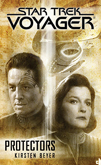 |
Order Star Trek Voyager: Protectors |
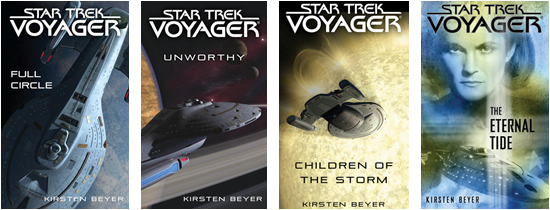 |
|||
| Amazon US Amazon UK Amazon DE |
Amazon US Amazon UK Amazon DE |
Amazon US Amazon UK Amazon DE |
Amazon US Amazon UK Amazon DE |
